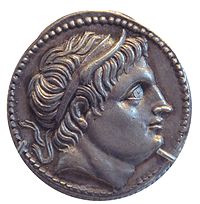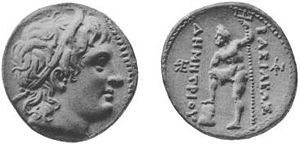- Demetrius I of Macedon
-
Demetrius I (Greek: Δημήτριος, 337 BC – 283 BC), called Poliorcetes (Greek: Πολιορκητής - "The Besieger"), son of Antigonus I Monophthalmus and Stratonice, was a king of Macedon (294–288 BC). He belonged to the Antigonid dynasty.
Contents
Biography
At the age of twenty-two he was left by his father to defend Syria against Ptolemy the son of Lagus; he was totally defeated in Battle of Gaza, but soon partially repaired his loss by a victory in the neighbourhood of Myus. In the spring of 310, he was soundly defeated when he tried to expel Seleucus I Nicator from Babylon; his father was defeated in the autumn. As a result of this Babylonian War, Antigonus lost almost two thirds of his empire: all eastern satrapies became Seleucus'.
After several campaigns against Ptolemy on the coasts of Cilicia and Cyprus, Demetrius sailed with a fleet of 250 ships to Athens. He freed the city from the power of Cassander and Ptolemy, expelled the garrison which had been stationed there under Demetrius of Phalerum, and besieged and took Munychia (307 BC). After these victories he was worshipped by the Athenians as a tutelary deity under the title of Soter (σωτήρ) ("Preserver").
In the campaign of 306 BC against Ptolemy he defeated Menelaus, Ptolemy's brother, in the naval Battle of Salamis, completely destroying the naval power of Egypt. Demetrius conquered Cyprus in 306 BC, capturing one of Ptolemy's sons.[1] Following the victory Antigonus assumed the title king and bestowed the same upon his son Demetrius. In 305 BC, now bearing the title of king bestowed upon him by his father, he endeavoured to punish the Rhodians for having deserted his cause; his ingenuity in devising new siege engines in his unsuccessful attempt to reduce the capital gained him the title of Poliorcetes. Among his creations were a battering ram 180 feet (55 m) long, requiring 1000 men to operate it; and a wheeled siege tower named "Helepolis" (or "Taker of Cities") which stood 125 feet (38 m) tall and 60 feet (18 m) wide, weighing 360,000 pounds.
In 302 BC he returned a second time to Greece as liberator, and reinstated the Corinthian League. But his licentiousness and extravagance made the Athenians long for the government of Cassander. Among his outrages was his courtship of a young boy named Democles the Handsome. The youth kept on refusing his attention but one day found himself cornered at the baths. Having no way out and being unable to physically resist his suitor, he took the lid off the hot water cauldron and jumped in. His death was seen as a mark of honor for himself and his country. In another instance, he waived a fine of 50 talents imposed on a citizen in exchange for the favors of Cleaenetus, that man's son.[2] He also sought the attention of Lamia, a Greek courtesan. He demanded 250 talents from the Athenians, which he then gave to Lamia and other courtesans to buy soap and cosmetics.[2]
He also roused the jealousy of Alexander's Diadochi; Seleucus, Cassander and Lysimachus united to destroy him and his father. The hostile armies met at the Ipsus in Phrygia (301 BC). Antigonus was killed, and Demetrius, after sustaining severe losses, retired to Ephesus. This reversal of fortune stirred up many enemies against him—the Athenians refused even to admit him into their city. But he soon afterwards ravaged the territory of Lysimachus and effected a reconciliation with Seleucus, to whom he gave his daughter Stratonice in marriage. Athens was at this time oppressed by the tyranny of Lachares - a popular leader who made himself supreme in Athens in 296 BC - but Demetrius, after a protracted blockade, gained possession of the city (294 BC) and pardoned the inhabitants for their misconduct in 301.
In the same year he established himself on the throne of Macedonia by murdering Alexander V, the son of Cassander. In 291 BC he married Lanassa, the former wife of Pyrrhus. But his new position as ruler of Macedonia was continually threatened by Pyrrhus, who took advantage of his occasional absence to ravage the defenceless part of his kingdom (Plutarch, Pyrrhus, 7 if.); at length, the combined forces of Pyrrhus, Ptolemy and Lysimachus, assisted by the disaffected among his own subjects, obliged him to leave Macedonia in 288 BC.
He passed into Asia and attacked some of the provinces of Lysimachus with varying success. Famine and pestilence destroyed the greater part of his army, and he solicited Seleucus' support and assistance. But before he reached Syria hostilities broke out, and after he had gained some advantages over his son-in-law, Demetrius was totally forsaken by his troops on the field of battle and surrendered to Seleucus.
His son Antigonus offered all his possessions, and even his own person, in order to procure his father's liberty. But all proved unavailing, and Demetrius died after a confinement of three years (283 BC). His remains were given to Antigonus and honoured with a splendid funeral at Corinth.
His descendants remained in possession of the Macedonian throne till the time of Perseus, when Macedon was conquered by the Romans in 168 BC.
Demetrius was married five times; his first wife was Phila daughter of Regent Antipater by whom he had two children: Stratonice of Syria and Antigonus II Gonatas. His second wife was Eurydice of Athens and his third wife was Deidamia, a sister of Pyrrhus of Epirus. Deidamia bore him a son called Alexander who is said by Plutarch to have spent his life in Egypt, probably in an honourable captivity. His fourth wife was Lanassa and fifth wife was Ptolemais, daughter of Ptolemy I Soter and Eurydice of Egypt, by whom he had a son called Demetrius the Fair. He also had an affair with a celebrated courtesan called Lamia of Athens, by whom he had a daughter called Phila.
Literary references
Demetrius appears (under the Greek form of his name, Demetrios) in L. Sprague de Camp's historical novel, The Bronze God of Rhodes, which largely concerns itself with his siege of Rhodes.
Alfred Duggan's novel Elephants and Castles provides a lively fictionalised account of his life.
References
 This article incorporates text from a publication now in the public domain: Chisholm, Hugh, ed (1911). Encyclopædia Britannica (11th ed.). Cambridge University Press.
This article incorporates text from a publication now in the public domain: Chisholm, Hugh, ed (1911). Encyclopædia Britannica (11th ed.). Cambridge University Press.
Sources
Ancient sources
- Plutarch, Life of Demetrius
- Diodorus Siculus, Library of History, books 19–21
- Polyaenus, Stratagems, 4.7
- Justin, Epitome of Trogus, books 15–16
- Athenaeus, Deipnosophists, 6.252–255
Modern sources
- R. M. Errington, A History of the Hellenistic World, pp. 33–58. Blackwell Publishing (2008). ISBN 978-0-631-23388-6.
- Demetrius I at Livius.org
See also
Regnal titles Preceded by
Antigonus I MonophthalmusAntigonid dynasty Succeeded by
Antigonus II GonatasPreceded by
Antipater II of MacedonKing of Macedon
294 BC – 288 BCSucceeded by
Lysimachus and Pyrrhus of EpirusKings of Macedon Argeads Karanus · Koenus · Tyrimmas · Perdiccas I · Argaeus I · Philip I · Aeropus I · Alcetas I · Amyntas I · Alexander I · Alcetas II · Perdiccas II · Archelaus I · Craterus · Orestes and Aeropus II · Archelaus II · Amyntas II · Pausanias · Argaeus II · Amyntas III · Alexander II · Perdiccas III · Amyntas IV · Philip II · Alexander the Great · Philip III · Alexander IVRegents Antipatrids Antigonids Demetrius I · Antigonus II · Demetrius II · Antigonus III · Philip V · Perseus · Philip VI (pretender)Non-Dynastic The Division of Alexander's Empire 
The works of Plutarch Works Lives Alcibiades and Coriolanus1 · Alexander the Great and Julius Caesar · Aratus of Sicyon & Artaxerxes and Galba & Otho2 · Aristides and Cato the Elder1 · Crassus and Nicias1 · Demetrius and Antony1 · Demosthenes and Cicero1 · Dion and Brutus1 · Fabius and Pericles1 · Lucullus and Cimon1 · Lysander and Sulla1 · Numa and Lycurgus1 · Pelopidas and Marcellus1 · Philopoemen and Flamininus1 · Phocion and Cato the Younger · Pompey and Agesilaus1 · Poplicola and Solon1 · Pyrrhus and Gaius Marius · Romulus and Theseus1 · Sertorius and Eumenes1 · Tiberius Gracchus & Gaius Gracchus and Agis & Cleomenes1 · Timoleon and Aemilius Paulus1 · Themistocles and Camillus
Translators and editors 1 Comparison extant · 2 Four unpaired Lives Categories:- 283 BC deaths
- 337 BC births
- Hellenistic generals
- Macedonian monarchs
- 3rd-century BC rulers
- Hellenistic ruler cult
- 3rd-century BC Greek people
- 3rd-century BC Macedonians
Wikimedia Foundation. 2010.



